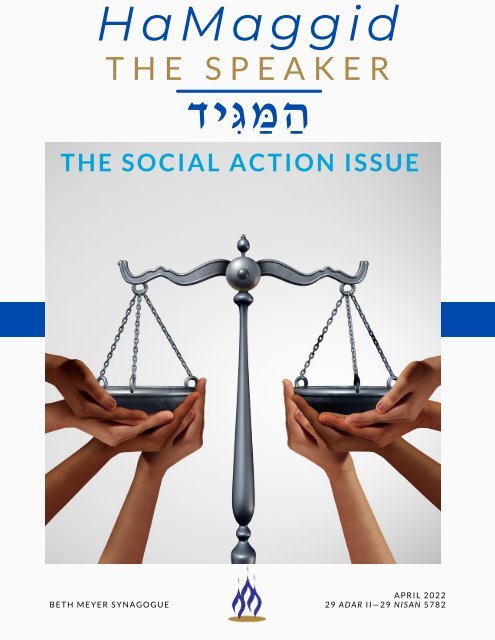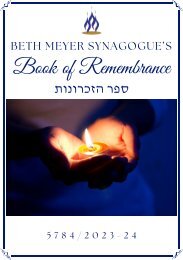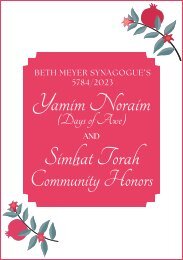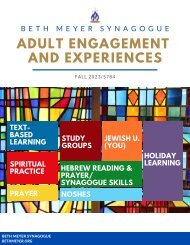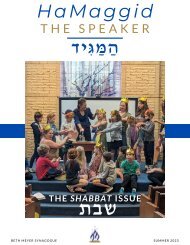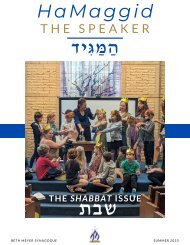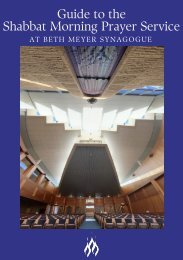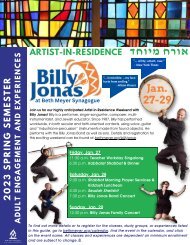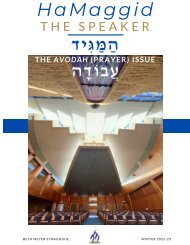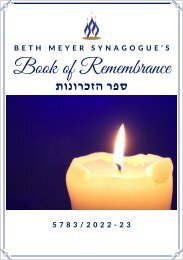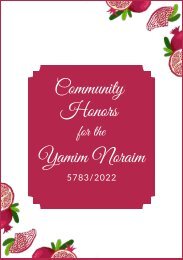HaMaggid April 2022 Edition
Please enjoy reading the April 2022 edition of "HaMaggid — The Speaker," a monthly publication of Beth Meyer Synagogue, a warm and welcoming Conservative congregation in Raleigh, N.C.
Please enjoy reading the April 2022 edition of "HaMaggid — The Speaker," a monthly publication of Beth Meyer Synagogue, a warm and welcoming Conservative congregation in Raleigh, N.C.
Create successful ePaper yourself
Turn your PDF publications into a flip-book with our unique Google optimized e-Paper software.
<strong>HaMaggid</strong><br />
T H E S P E A K E R<br />
הַ מּ ַ ִגּיד<br />
T H E S O C I A L A C T I O N I S S U E<br />
B E T H M E Y E R S Y N A G O G U E<br />
A P R I L 2 0 2 2<br />
2 9 A D A R I I — 2 9 N I S A N 5 7 8 2
IN THIS ISSUE<br />
FEATURES: SOCIAL ACTION<br />
<strong>HaMaggid</strong> — The Speaker is a publication<br />
of Beth Meyer Synagogue, a warm and<br />
welcoming Conservative congregation<br />
located at 504 Newton Road, Raleigh,<br />
NC 27615. (919) 848-1420.<br />
Board of Trustees<br />
Keith Satisky, President<br />
Steve Hammel, Vice President of<br />
Organizational Health<br />
Sherry Shapiro, Vice President of<br />
Jewish Living and Learning<br />
Sam Suls, Treasurer<br />
Bonnie Leach, Secretary<br />
Sandi Bouchard<br />
Susan Ehrlich, Immediate Past President<br />
Jennifer Etkin<br />
Rick Kane<br />
Steve Katz<br />
Suzanne Kirschbaum<br />
Karl Mundt<br />
Benjamin Pollack<br />
Adam Rosenzweig<br />
Shana Silverstein<br />
Professional Staff<br />
Eric Solomon, Rabbi<br />
Dr. Jenny Solomon, Rabbi<br />
11<br />
12<br />
13<br />
14-15<br />
16-17<br />
18-19<br />
21<br />
3<br />
8<br />
9<br />
20<br />
22-23<br />
RESETTING THE TABLE<br />
JEWISH VALUES AND REPRODUCTIVE RIGHTS<br />
A LOOK AT THE INTER-FAITH FOOD SHUTTLE<br />
WHAT IS HIAS?<br />
CELEBRATING THE ROLE OF WOMEN IN THE PASSOVER STORY<br />
BUILDING FAITH: A Q&A WITH STEVE LASALA, BETH MEYER<br />
CONGREGANT AND INTERFAITH BUILD HABITAT COORDINATOR<br />
SPIRITUAL PRACTICE FOR THE SAKE OF SOCIAL TRANSFORMATION<br />
DEPARTMENTS<br />
AROUND THE SHUL<br />
• News<br />
• New Members Welcome<br />
• This Month<br />
• Sch“musings”<br />
• Books on Social Action and Pesah<br />
PRESIDENT’S MESSAGE<br />
RABBI’S MESSAGE<br />
EDUCATOR’S MESSAGE<br />
DONATIONS<br />
See page 4 for this story<br />
See page 15 for this story<br />
Jonathan Wertheim, Executive Director<br />
Carole Eagle, Director of Member Services<br />
Sarah Beall, Facilities Coordinator and<br />
Clergy Support<br />
Lauren Isaacs, Communications Manager<br />
Samantha Gottlich, Programs Coordinator<br />
Cathy Kaplan, Director of Religious<br />
School and Family Programs<br />
Britt Stamey, Religious School Assistant<br />
Rebecca Krantz, Preschool Director<br />
Dana Needham, Youth Programs Advisor<br />
Steve Sheriff, Facilities<br />
Stuart Mozer, Kitchen<br />
See page 20 for this story
NEWS AROUND THE SHUL<br />
THIS ISSUE ><br />
SOCIAL JUSTICE<br />
TAKES CENTER<br />
STAGE<br />
by Lauren Isaacs, Communications Manager<br />
laureni@bethmeyer.org<br />
In this edition of <strong>HaMaggid</strong>,<br />
we’re turning our gaze to<br />
social action and how it fits<br />
in at Beth Meyer Synagogue.<br />
It’s the perfect time of year<br />
to explore this topic as we<br />
begin our Pesah preparations.<br />
Passover is rich in social<br />
justice themes. It is<br />
impossible to study the<br />
Jewish story of redemption<br />
and not feel compelled to<br />
eradicate injustice in the world today. Among the primary<br />
social justice themes found in the Exodus story and in<br />
Passover observance are hunger, homelessness,<br />
oppression, and redemption. You’ll find these very themes<br />
echoed in the pages of this edition.<br />
I hope this <strong>HaMaggid</strong> issue conveys our commitment to<br />
social action, helps us discover entry points on how we can<br />
help, and inspires us to move to action. Happy reading!<br />
COMMUNITY ><br />
NORTH CAROLINA<br />
JEWISH CLERGY<br />
ASSOCIATION<br />
(NCJCA) LAUNCHES<br />
Standing on the shoulders of the North Carolina<br />
Association of Rabbis that thrived from 1950-1969,<br />
founding co-chairs, Rabbi Judy Schindler and Rabbi Eric<br />
Solomon, in partnership with Steering Committee members<br />
Cantor Shira Lissek, Rabbi Batsheva Meiri, Rabbi Lucy<br />
Dinner, Rabbi Andy Koren, and Rabbi Mark Cohn, have<br />
launched the NCJCA. The mission of the NCJCA is to bring<br />
together the more than 80 Jewish clergy to support the<br />
interests of the Jewish people, serve as a collective voice,<br />
and support each other in learning and life. By bringing NC<br />
Jewish clergy from across denominations closer together,<br />
we will be able to more effectively support and unify our<br />
people from Wilmington to Asheville.<br />
The public is invited to celebrate the founding of NCJCA on<br />
Tuesday, <strong>April</strong> 12, from 2-3 p.m. via a virtual press<br />
conference on Zoom. Congresswoman Kathy Manning has<br />
confirmed her attendance and will offer a blessing. Other<br />
NC Jewish civic and lay leaders are expected to participate<br />
as well. As part of the program, the NCJCA will share an<br />
original North Carolina 5782/<strong>2022</strong> Passover Seder<br />
Supplement for the North Carolina Jewish community to<br />
use at seder tables.<br />
To attend the launch, please RSVP at https://bit.ly/3JUB2Nj<br />
WELCOME! ><br />
Beth Meyer Synagogue extends a warm welcome to the<br />
following individuals and families who recently joined our<br />
congregation.<br />
Jeff and Cindy Dunn live in Wake Forest and have two<br />
children: Maia and Nina. They are the son and daughter-inlaw<br />
of members, Arnold and Michelle Dunn.<br />
Danielle and Michael Penick moved to Raleigh from<br />
Arizona and, coincidentally, know Rabbi Eric’s brother-inlaw,<br />
Rony (small world!). They have two children, Hannah<br />
(8) and Maya (6). Danielle is a hospital pharmacist with<br />
Cardinal Health and Michael is a software engineer<br />
with Datastax.<br />
Holly and Zac Kelton are returning members and live in<br />
Raleigh. They have a son, Isaac. Holly is a Manager at YELP.<br />
Zac is a Patent Attorney at Kilpatrick Townsend.<br />
Ora and Michael Kramer live in Raleigh after having<br />
recently moved from Skokie, IL. They have two grown sons,<br />
Zachary and Matthew. Ora is a former attorney, while Mike<br />
retired from The Boeing Co. and is currently an adjunct<br />
professor at the University of Denver.<br />
Aaron and Stephanie Epel reside in Raleigh. They are<br />
married and newish to the area after moving here from<br />
Florida to be near family. Aaron is a Data Scientist with<br />
EnMass Energy and Stephanie is a Site Investigator for<br />
Pfizer. Aaron and Stephanie welcomed the birth of their son<br />
on March 26. Mazal tov!<br />
H A M A G G I D | 3
AROUND THE SHUL THIS MONTH<br />
<strong>April</strong><br />
a selection of what to do & where to go<br />
for a complete list of shul services and events, and to register, visit bethmeyer.org/calendar<br />
Apr.<br />
9<br />
Special Shabbat Guest:<br />
Congresswoman Deborah Ross<br />
Saturday, <strong>April</strong> 9, 9:30 a.m.-1 p.m., hybrid<br />
Congresswoman Deborah Ross will be speak about antisemitism at Shabbat services. Join for<br />
kiddush after services.<br />
Apr.<br />
13<br />
RSVP BY<br />
Apr.<br />
28<br />
Sisterhood Tour of JC Raulston<br />
Arboretum<br />
Sunday, <strong>April</strong> 24, 1:30-3 p.m., in person<br />
Enjoy spring in all its glory with fellow Sisterhood members! Get outside and enjoy the beauty<br />
of nature, and, perhaps, learn what we can do to help protect nature. After all, Jewish law and<br />
tradition teaches us that we not only have a responsibility to be stewards of the world but<br />
that we also owe a debt of gratitude for the world we inhabit, which provides us with<br />
sustenance and pleasure. Please bring a water bottle and wear comfortable shoes.<br />
What Happened at Mount Sinai?<br />
Thursdays, <strong>April</strong> 28, May 5 & 12, 7:30-9 p.m., virtual<br />
In preparation for the holiday of Shavuot when we celebrate receiving the Torah on Mt. Sinai,<br />
join Rabbi Eric Solomon as he shares his favorite commentaries, midrashim (rabbinic stories)<br />
and mystical interpretations of the greatest moment in Jewish, and possibly world, history.<br />
May<br />
1<br />
Good Deeds Day at BMS<br />
Sunday, May 1, 1-6 p.m., in person<br />
In partnership with Jewish Family Services, Beth Meyer will be hosting volunteer<br />
opportunities on campus throughout the day, including a blood drive from 9 a.m.-1:30 p.m.,<br />
and other activities for all ages. Stay tuned for more details!<br />
4 | H A M A G G I D
8 a.m. Pre-Pesah Siyum<br />
•<br />
at left)<br />
(details<br />
PESAH AROUND THE SHUL<br />
Apr.<br />
10<br />
Apr.<br />
15<br />
Apr.<br />
15<br />
Apr.<br />
19<br />
Apr.<br />
24<br />
Apr.<br />
28<br />
Pesah<br />
Embodied Prayer Through<br />
Gentle Yoga<br />
Sunday, <strong>April</strong> 10, 7-8:15 p.m., Social Hall (NEW location!)<br />
Join Rabbi Dr. Jenny Solomon and Dr. Barbara Vosk for a prayerful<br />
yoga practice. This quiet and rejuvenating practice helps melt away<br />
tension in the body and offers another avenue to express our<br />
prayers, moving from rote recitation to meaningful and<br />
contemplative embodied prayer. This class is appropriate for<br />
everyone; no previous yoga experience is required.<br />
Pre-Pesah Siyum<br />
Friday, <strong>April</strong> 15, 8-9 a.m., Zoom<br />
All first-born children are encouraged to participate in this unique<br />
fast day tradition for first-born children and to mark the end of the<br />
study of a Talmudic volume with Rabbi Mordecai Schwartz.<br />
Registration is via the Rabbinical Assembly. Participation is free and<br />
movement-wide. All are welcome to join us for this all-levels<br />
celebration of learning.<br />
Community Pesah Seder<br />
Friday, <strong>April</strong> 15, 6:15-8:30 p.m., Social Hall<br />
Rabbis Eric and Jenny Solomon will lead a Community Pesah Seder<br />
catered by Bruce Kaplan. Doors open at 6:15 p.m.; the seder begins<br />
at 6:30 p.m. This event will be capped at 100 guests. $50 per plate<br />
for adults; $25 for children 12 and under. Register online by<br />
Tuesday, <strong>April</strong> 12.<br />
Pesah Wine Tasting<br />
Tuesday, <strong>April</strong> 19,7-8 p.m., Social Hall<br />
Steven Kerbel will be hosting on Zoom, but this will be an in-person<br />
event otherwise. He uses Pesah wines that mostly come from Israel.<br />
There will be snacks and tasting notes.<br />
Mimouna Bagel Brunch<br />
Sunday, <strong>April</strong> 24, 9:30-11:30 a.m. (NEW time!), Courtyard<br />
In celebration of our global Jewish culture, enjoy a bagel brunch,<br />
plus Middle Eastern and Moroccan food, for Mimouna — the<br />
Sephardic conclusion of Pesah. Catered by Bruce Kaplan.<br />
HIAS Refugee Shabbat<br />
Saturday, <strong>April</strong> 23, 9:30 a.m., Sanctuary and livestream<br />
Join us for a HIAS (Hebrew Immigrant Aid Society) Shabbat service,<br />
which will also include special prayers for Pesah Day 8 and Yizkor.<br />
The D’var Torah will be on the theme of immigration, include a short<br />
presentation on HIAS’ work, and have a donation opportunity.<br />
Services<br />
Erev Pesah, Friday, <strong>April</strong> 15<br />
• 6:15 p.m. Community Pesah Seder<br />
at left)<br />
(details<br />
7:29 p.m. Candle Lighting<br />
•<br />
Pesah Day 1, Saturday, <strong>April</strong> 16<br />
9:30 a.m. Shabbat service<br />
•<br />
8:31 p.m. Candle lighting<br />
•<br />
Day 2, Sunday, <strong>April</strong> 17<br />
Pesah<br />
9:30 a.m. service (in lieu of 9 a.m.<br />
•<br />
minyan), Sanctuary<br />
• 8:32 p.m. Havdalah<br />
Pesah Day 7, Friday, <strong>April</strong> 22<br />
• 10 a.m. service, Zoom only<br />
• 7:35 p.m. Candle Lighting<br />
• 8 p.m. Kabbalat Shabbat<br />
Pesah Day 8, Saturday, <strong>April</strong> 23<br />
Immigrant<br />
(Hebrew HIAS a.m. 9:30 •<br />
Society) themed Shabbat<br />
Aid<br />
and Yizkor (details at left)<br />
service<br />
• 8:37 p.m. Havdalah<br />
H A M A G G I D | 5
AROUND THE SHUL SCHMUSINGS<br />
Sch“musings”<br />
We asked congregants:<br />
“What do you do to tackle an<br />
issue, support other people,<br />
or improve our world?”<br />
“In December before the pandemic, Zach and<br />
I founded Neshama Animal Rescue in<br />
response to the crisis of NC animals being<br />
euthanized in shelters, which is the third<br />
highest in the country. We work with mostly<br />
rural shelters which have overpopulation problems and not<br />
a lot of access to rescues due to low staff numbers. We<br />
recruit volunteers to foster the animals until they are<br />
adopted. We’ve had great success working with local<br />
universities and college Jewish organizations to promote<br />
fostering and adopting.” -Anne Teicher<br />
“Improving our local area starts with helping the<br />
community one person at a time. I volunteer with<br />
elderly people. One person who I spend time with<br />
in particular is blind and counts on me to help her<br />
grocery shop and take her to doctor appointments.<br />
This helps her so that she can still<br />
live in an apartment rather than in<br />
a group setting. She greatly<br />
appreciates it and it warms my<br />
heart.” -Renee Hammel<br />
“I go on a dental mission trip yearly to Moldova to perform pediatric<br />
dentistry clinics to an orphanage of 600 children, as well as to<br />
underpriviledged Jewish children.” -Dr. Burton Horwitz<br />
“Giving back to ensure the health, safety and well-being of families and,<br />
particularly children, has been an essential aspect of both my personal<br />
and professional life. I share this ethic with my own children and we are<br />
all involved in volunteering, raising funds for, and providing needed<br />
items to some very special local places, including Note in the Pocket,<br />
The Green Chair Project, and JFS. I am also blessed with an amazing professional<br />
position-helping make wishes come true for children with life threatening illnesses at<br />
Make-a-Wish Eastern NC.” -Robin Dorfman<br />
6 | H A M A G G I D
R I T A ’ S P I C K S :<br />
B O O K S O N S O C I A L A C T I O N<br />
LIBRARY<br />
AROUND THE SHUL<br />
by Rita Gerber, Library Volunteer<br />
bethmeyerlibrary@gmail.com<br />
If you have any book suggestions or ideas for improving our library, contact me!<br />
The Beth Meyer Synagogue library in the Satisky building offers a comprehensive collection of materials<br />
for congregants to sign out and borrow. Find the below books on our shelves.<br />
P E S A H B O O K S<br />
Make Your Own<br />
Passover Seder: A<br />
New Approach to<br />
Creating a Personal<br />
Family Celebration<br />
Rabbi Alan Kay<br />
Judaism and Justice:<br />
The Jewish Passion<br />
to Repair the World<br />
Rabbi Sidney Schwarz<br />
“Rabbi Schwarz affirms in<br />
his introduction that his<br />
book explores the<br />
relationship between<br />
Judaism, social justice, and<br />
the identity of American<br />
Jews. He chronicles the<br />
organized Jewish<br />
community and its publicaffairs<br />
agenda from the end<br />
of World War II in 1945<br />
through the early years of<br />
the twenty-first century. ”<br />
—Booklist<br />
Thank you to dedicated<br />
volunteers Denise<br />
Friedrich and Norma<br />
Zendels for all their<br />
help in the library!<br />
Julius Rosenwald:<br />
Repairing the World<br />
Hasia R. Diner<br />
“[this book] looks at the<br />
philanthropic efforts of the<br />
man who built Sears, Roebuck<br />
into a retail giant but who<br />
became better known for<br />
financing 5,000 schools for<br />
black children in the<br />
segregated South. Both his<br />
generosity and the conditions<br />
he attached to it, Ms. Diner<br />
argues, reflected his<br />
understanding of the<br />
religious principle that Jews<br />
should seek to “repair the<br />
world.”<br />
—Marc Levinson, Wall Street<br />
Journal<br />
Mishkan Ga’avah<br />
Where Pride Dwells:<br />
A Celebration of<br />
LGBTQ Jewish Life<br />
and Ritual<br />
Edited by Rabbi Denise L.<br />
Eger<br />
“As LGBTQ Jews, we<br />
remember the painful<br />
history of exclusion and<br />
marginalization that has<br />
long cast a shadow over the<br />
pride we take in our faith.<br />
This beautifully written,<br />
painstakingly edited book is<br />
an important and joyful<br />
contribution towards a fully<br />
inclusive Judaism, one<br />
which actively celebrates<br />
our identities and<br />
recognizes that all of us are<br />
created b’tzelem Elohim,<br />
in God’s image.”<br />
—Rabbi Sharon Kleinbaum,<br />
Senior Rabbi, Congregation<br />
Beit Simchat Torah, NY, NY<br />
Passover: The Family<br />
Guide to Spiritual<br />
Celebration<br />
Dr. Ron Wolfson<br />
300 Ways to<br />
Ask the Four<br />
Questions<br />
Murray Spiegel<br />
and Rickey<br />
Stein<br />
Plus, the library contains several<br />
different Haggadot with lots of ideas<br />
for a great seder!<br />
H A M A G G I D | 7
PRESIDENT’S MESSAGE<br />
‘Justice, Justice Shall You Pursue’<br />
by Keith Satisky, ksatisky@satiskysilverstein.com<br />
President<br />
In Florida, the state seems poised to pass the Parental<br />
Rights in Education bill, commonly referred to as the “Don’t<br />
Say Gay” proposal. If signed into law, it would ban<br />
“classroom instruction” on gender identity or sexual<br />
orientation that is not “age appropriate” between<br />
kindergarten and third grade, which would stigmatize the<br />
LGBTQ community. Texas’s governor, meanwhile, issued a<br />
directive to state health agencies that doctors, nurses and<br />
teachers must report gender-affirming treatments for<br />
transgender youth to the government, as they are always<br />
now considered “child abuse.”<br />
These states are not alone in passing or considering laws<br />
targeting the LGBTQ community, especially transgender<br />
youth. The Human Rights Campaign deemed 2021 the worst<br />
year in recent history for anti-LGBTQ legislation, which<br />
includes bans on both trans athletes competing as their<br />
identified gender and gender-confirming health care for<br />
trans youth. <strong>2022</strong> could be even worse.<br />
engaging with your school board to make sure that teachers<br />
don’t feel afraid to teach and LGBTQ kids don’t feel afraid<br />
to be themselves. It could mean donating to social justice<br />
organizations who are fighting back against this hate or<br />
even volunteering with them.<br />
I know that finding the time and willpower to advocate for<br />
social justice can be difficult, believe me. Plus, not<br />
everyone even agrees on what constitutes social justice.<br />
But every small action makes a difference, and it is never<br />
too late to get started. As stated in Deuteronomy, “Justice,<br />
justice shall you pursue.”<br />
What does this wave of passed and proposed anti-LGBTQ<br />
legislation have to do with the Jewish community? As with<br />
all cases of injustice against minority groups, Jews should<br />
feel compelled to speak up and fight against this<br />
mistreatment of the LGBTQ community. First and foremost,<br />
LGBTQ-identifying Jews make up an important part of our<br />
congregation and religion as a whole, and we are all God’s<br />
people deserving of His love. Remember, humans were<br />
created in the “image of God” (Genesis 1:26).<br />
Furthermore, just because Jews are not targeted in these<br />
particular laws, it does not mean we as a people do not<br />
understand what it means to be oppressed or despised.<br />
Jews and Jewish leaders have stood in solidarity with social<br />
movements throughout this country’s history, and we<br />
should continue to stand up for social justice today.<br />
My last <strong>HaMaggid</strong> column centered around acts of<br />
lovingkindness, which can entail treating anyone who<br />
identifies as LGBTQ with dignity and love, even if it<br />
confuses or upsets you. This month’s theme of social<br />
justice/action is about taking that next step beyond acts of<br />
lovingkindness to effect wider change. It could mean<br />
“God created human beings in God’s<br />
image...” -Genesis 1:26<br />
צלם אלהים<br />
8 | H A M A G G I D
RABBI’S MESSAGE<br />
A Rabbi’s Job: Afflict The Comfortable and<br />
Comfort The Afflicted<br />
by Rabbi Eric Solomon, erics@bethmeyer.org<br />
When God commanded Moshe Rabbeinu<br />
(Moses our Teacher) to go to Pharoah and<br />
say, “Let my people go!”— Moshe was far<br />
from enthusiastic.<br />
His response was, essentially, “Who, me?“<br />
Still, fairly quickly, God was able to persuade<br />
Moshe that he was the right person for the<br />
job. And in the process, the model for Jewish<br />
leadership was born.<br />
How so? Moshe was not only commanded to<br />
tell Pharoah things he didn’t want to hear.<br />
Equally as important, Moshe was told to tell<br />
his own people things that they didn’t want<br />
to hear. Remember: Not all of our people<br />
were eager to leave Egypt.<br />
From that point onward, the standard<br />
was set: A Jewish leader is not just one<br />
who speaks out to the world about<br />
injustice; a Jewish leader speaks inward<br />
as well, to their own community.<br />
Let’s not underestimate how challenging<br />
that can be.<br />
An example: In the 1960s American<br />
South, historians recorded numerous<br />
cases when rabbis spoke from the bimah<br />
about the moral imperative of Civil<br />
Rights. While many of us tend to focus<br />
on the numerous congregations who —<br />
at some risk — embraced that message,<br />
the more difficult truth is that not every<br />
congregation heeded their rabbis’ calls.<br />
“Moshe was not<br />
only commanded<br />
to tell Pharoah<br />
things he didn’t<br />
want to hear.<br />
Equally as<br />
important, Moshe<br />
was told to tell his<br />
own people things<br />
that they didn’t<br />
want to hear.”<br />
H A M A G G I D | 9
RABBI’S MESSAGE<br />
In fact, many rabbis risked their careers<br />
and lost their jobs by sharing their Torahbased<br />
message for equality with their<br />
congregations.<br />
The American idea that a clergy person<br />
has the right to freely speak their<br />
interpretation of the Torah is called,<br />
“Freedom of the Pulpit.” In nearly all<br />
rabbinical contracts (including mine and<br />
Rabbi Jenny’s), there are clauses detailing<br />
that we have the unfettered right to<br />
interpret and share moral messages of<br />
the Torah without interference.<br />
Note that this is in complete<br />
contradistinction to undemocratic<br />
countries throughout the world. In Imam<br />
Abdullah Antepli’s recent sermon to our<br />
shul in response to the antisemitic attack<br />
in Colleyville, Texas, he stated as an aside,<br />
that many countries around the world (e.g.<br />
Egypt, Turkey) dictate to religious leaders<br />
what they can and cannot preach. They do<br />
not have the American freedom to speak<br />
their minds.<br />
To be clear, when Rabbi Jenny or I offer<br />
our Torah-rooted perspective on a social<br />
justice issue, we do not expect our entire<br />
congregation to rise up with a collective,<br />
“Amen!” While it certainly would be nice,<br />
we are fully aware that when you have two<br />
Jews, there are at least three opinions. We<br />
believe that a diversity of views is a Jewish<br />
value that is as ancient as the Talmud.<br />
The key word is “our.” These are our<br />
interpretations and our positions, not<br />
necessarily Beth Meyer Synagogue’s<br />
position. In those cases when our<br />
congregation seeks to take a stand on an<br />
issue-of-the-day (e.g. HB-2), our board<br />
takes a formal vote. If a vote passes, then<br />
we can clearly state that Beth Meyer<br />
Synagogue believes “X”. Without that vote,<br />
the Torah interpretations of the rabbis are<br />
ours alone.<br />
1 0 | H A M A G G I D<br />
There is some complexity here for when<br />
we serve as Beth Meyer’s rabbis, a<br />
privilege we do not take lightly; the<br />
public will often associate our public<br />
statements with our congregation. We<br />
are mindful of that association and take it<br />
very seriously.<br />
In the end, by hiring Rabbis Solomon, we<br />
have forged a unique covenant together.<br />
One in which you asked us to follow the<br />
great teaching of Rabbi Israel Salanter, a<br />
great German rabbi from the 1800s: “A<br />
rabbi whose community does not<br />
disagree with him is no rabbi. A rabbi<br />
who fears his community is no man.” Or,<br />
similarly stated by theologian Reinhold<br />
Niebuhr, a clergyperson’s job is to “afflict<br />
the comfortable and comfort the<br />
afflicted.”<br />
We promise you that we will never take<br />
a Torah-based social justice position<br />
without deep thought, study, and<br />
prayer. And we will always do our best to<br />
open our hearts and ears to those who<br />
thoughtfully and respectfully disagree.<br />
In that way, we will be following the<br />
Jewish leadership model which has<br />
helped our people to flourish for<br />
thousands of years. It all started at the<br />
Burning Bush when God told Moshe it’s<br />
time to tell Pharaoh, and our own people,<br />
some things they did not readily want<br />
to hear.<br />
Glossary of<br />
Important Terms<br />
תיקון עולם<br />
Tikkun Olam<br />
The Hebrew phrase Tikkun Olam<br />
(“Repair of the world”) has a long<br />
history in rabbinic texts (e.g. Mishnah<br />
and Talmud). Later, the phrase was<br />
employed by Jewish mystics,<br />
especially Rabbi Isaac Luria of Tzfat, to<br />
refer to a spiritual brokenness in the<br />
world that could be mended through<br />
the performance of mitzvot<br />
(commandments). In contemporary<br />
times, the phrase Tikkun Olam is most<br />
commonly used to mean that the<br />
Jewish community should see itself as<br />
obligated to repair our broken society<br />
and that is the Jewish people’s<br />
responsibility to act to fix social<br />
challenges like racism, antisemitism,<br />
climate change, hatred, war, etc. While<br />
Tikkun Olam is sometimes associated<br />
with a certain political perspective,<br />
that is not necessarily the case. Both<br />
political Liberals and Conservatives<br />
see the world as riddled with<br />
challenges and both seek to solve<br />
those problems with different ideas<br />
and policies. In that sense, any person<br />
who seeks to change the world for the<br />
better is doing the work of Tikkun<br />
Olam. For further reading:<br />
myjewishlearning.com/article/tikkunolam-repairing-the-world/<br />
Social Action vs. Social Justice<br />
While these two phrases are often<br />
used interchangeably in conversation,<br />
there is an important distinction<br />
between the two. Social Action refers<br />
to actions performed to help<br />
ameliorate specific social problems.<br />
For example, volunteering at a food<br />
bank to help feed those who are<br />
hungry would be an act of “Social<br />
Action.” Social Justice refers to more<br />
systemic work to address social<br />
problems. For example, lobbying a<br />
politician to support greater funding<br />
for social service programs would be<br />
considered an act of “Social Justice.”<br />
Both are important Jewish values.
Resetting<br />
the Table<br />
by Samantha Gottlich, samanthag@bethmeyer.org<br />
Programs Coordinator<br />
Beth Meyer Synagogue is proud to be partnering with an<br />
organization named Resetting the Table with the goal of<br />
facilitating meaningful and productive conversations<br />
throughout the congregation. We will be focusing on<br />
divisive topics, including, but not limited to, the political<br />
climate in America and stances on Israel.<br />
Rabbi Eric, Jim Doerfler, and I started working virtually with<br />
Resetting the Table several months ago. We were granted<br />
the opportunity to join professional facilitators and many<br />
clergy leaders and support to relearn how to discuss<br />
difficult topics that often elicit an emotional response. Each<br />
meeting had a different theme that was geared towards<br />
building greater communication and listening skills. We<br />
learned how to identify the core meaning of what matters<br />
most to people in a discussion, effective ways to<br />
demonstrate understanding, how to identify and<br />
appropriately respond to differences, and how to “build a<br />
culture of dialogue” within our congregation.<br />
Resetting the Table’s guidance could not have come at a<br />
better time. Over the past few years, it has become<br />
increasingly difficult to have a healthy discussion with peers<br />
on “hot” topics. Our community has become polarized to the<br />
point where many of us may have had to separate from<br />
friends and loved ones with opposing views in one way or<br />
another. Some have deleted or blocked peers on social<br />
media, while others suffered the devastating consequences<br />
of no longer speaking to immediate family members and<br />
best friends.<br />
Meeting and working with clergy and support from all over<br />
the country was an eye-opening experience. We were able<br />
to connect with each other despite our differences in<br />
opinions. There was a great mix of folk on all sides of the<br />
political spectrum, which was key in learning to navigate<br />
difficult topics. Our group truly heard and respected each<br />
other, making an ‘oil and water’ combination flow<br />
beautifully.<br />
To put these skills into practice, we have organized two<br />
gatherings that will be professionally facilitated by Resetting<br />
the Table staff to ensure the conversations stay fair and<br />
productive. On May 22 and 25, we will be conducting a<br />
Speaking Across Conflict with a small group of congregants.<br />
These two sessions will demonstrate how to build greater<br />
communication and listening skills, while giving a platform for<br />
all opinions — no matter the side — to be discussed. On<br />
June 26, there will be a Town Hall where those who sign up<br />
will be given the opportunity to work with Rabbi Eric, Jim, me,<br />
and the previously mentioned small group on teaching and<br />
using these skills on a broader plane. Once again, we<br />
encourage all viewpoints to be represented. Rabbi Eric will<br />
also be giving a sermon in the near future related to Resetting<br />
the Table and its mission as a whole and within our<br />
community.<br />
We want to empower our entire congregation with stronger<br />
communication skills. Beth Meyer should be a safe space for<br />
all and it is so important to feel represented and heard,<br />
regardless of your beliefs. Please look out for more details<br />
and registration information in the upcoming weeks. If you<br />
have questions or concerns, please do not hesitate to<br />
reach out.<br />
“These arguments and those<br />
arguments are both the words of<br />
the Living God.” -Talmud, Eruvin 13b<br />
אלו ואלו דברי אלהים חיים<br />
H A M A G G I D | 1 1
Jewish Values<br />
and<br />
Reproductive Rights<br />
by Jim Doerfler, jfduley@gmail.com<br />
Progressive Kehillah member<br />
Judaism encourages us to be fruitful and multiply. But<br />
parenting is not for everyone — certainly not at every stage<br />
of life or under all circumstances. And, so, as Jews we<br />
strongly support contraception and reproductive autonomy.<br />
Jewish law around abortion is complex. Unlike faith<br />
traditions which view abortion as “murder,” Judaism simply<br />
does not. A fetus is not yet a “life” but a potential life,<br />
precious and important, but not as important as the welfare<br />
of a pregnant woman. In Exodus 21:22-23, we learn that if a<br />
pregnant woman is knocked down and miscarries, those<br />
responsible pay a fine, but not the penalty of “a life for<br />
a life.”<br />
Our Talmudic tradition teaches that a developing fetus is an<br />
integral part of the woman’s body until birth. Modern<br />
Jewish rabbinic sources agree that if the continuation of a<br />
pregnancy might threaten the health of the mother,<br />
abortion is not only permitted but required.<br />
The Rabbinical Assembly’s Committee on Jewish Law and<br />
Standards took the view in 1983 that an abortion is<br />
justifiable if a continuation of the pregnancy might cause<br />
the mother severe physical or psychological harm, or when<br />
a child would be born so ill as not to survive or who would<br />
be severely disabled.<br />
Our moral values as Jews run counter to these restrictions,<br />
which impose time limits not acknowledged by Jewish law<br />
and which do not include exceptions for the life and health<br />
of the pregnant person. To impose a narrow, sectarian<br />
position on abortion is nothing less than an attack on the<br />
constitutionally protected religious liberty of Jews and<br />
others with differing beliefs.<br />
Abortion in a post- or modified-Roe and Casey North Carolina<br />
is likely to be a political battlefield. A 20-week abortion ban<br />
was ruled unconstitutional in 2019 and would likely go into<br />
effect. Governor Roy Cooper has vetoed several attempts by<br />
the General Assembly to add restrictions. Parental consent,<br />
biased counseling requirements, and waiting periods now are<br />
and would remain the law.<br />
North Carolina is likely to become a haven for women from<br />
nearby states if laws are triggered by a repeal of Roe.<br />
Mississippi, Georgia, and South Carolina have 6-week bans.<br />
Kentucky, Tennessee, and Alabama would ban nearly all<br />
abortions.<br />
Legislators have vowed to work to ban abortion here as well,<br />
where it will be an issue in the 2024 governor’s race. Jews will<br />
be called upon to speak out for religious liberty and the rights<br />
of Jewish and non-Jewish women alike.<br />
Orthodox writer Blu Greenberg elaborates on what we<br />
mean by mental health. “Such conditions include the<br />
emotional inability to cope with childbearing and rearing —<br />
for example the need to support oneself (or one’s spouse)<br />
through school, the time required for a marriage to stabilize,<br />
overwhelming responsibilities to other children,” etc.<br />
A Supreme Court ruling in Whole Woman’s Health v. Jackson<br />
is expected this summer. As Americans face the prospect of<br />
a repeal or revision of Roe v. Wade (1973) and Planned<br />
Parenthood v. Casey (1992), state legislatures have passed<br />
laws severely limiting or eliminating access.<br />
1 2 | H A M A G G I D<br />
What is the Progressive Kehillah?<br />
Progressive Kehillah (PK) at Beth Meyer is a<br />
community that provides a space for those concerned<br />
with progressive political, social, and moral issues and<br />
their expression. PK was formed by members<br />
committed to infusing Jewish life with the prophetic<br />
call for social justice, human rights and dignity,<br />
compassion and non-violence.<br />
PK honors the diversity of perspectives that<br />
constitute the Beth Meyer congregation. In that spirit<br />
we encourage conversations — rooted in Jewish<br />
values — across all political spectrums (domestic,<br />
Israeli and international).<br />
H A M A G G I D | 1 9
A look at the<br />
Pre-Pesah Hametz<br />
Food Collection for<br />
Inter-Faith Food Shuttle<br />
The Passover ritual of removing<br />
leavened products from the home<br />
provides an opportunity to collect<br />
food donations and reminds us of<br />
those in our local community who<br />
search daily for a nutritional meal.<br />
Bins for hametz items will be<br />
in the lobby <strong>April</strong> 1-13.<br />
“And when you reap the harvest of<br />
your land, you shall not reap all the<br />
way to the edges of your field...you<br />
shall leave them for the poor and the<br />
stranger...” -Leviticus 23:22<br />
וְלַגּ ֵ֙ר תַּ ֽעֲ זֹ ֣ב אֹתָ ֔ם<br />
by Deborah Goldstein,<br />
Social Action Committee Chair<br />
lailatov02@gmail.com<br />
When I first came to Beth Meyer, the go-to organization for<br />
donating food leftover from any synagogue event was the<br />
Inter-Faith Food Shuttle. Driving up in a minivan with the<br />
symbols of many different faiths painted on the side,<br />
volunteers would take our leftover food and deliver it to<br />
shelters and soup kitchens around Raleigh.<br />
Over the years our relationship with the Inter-Faith Food<br />
Shuttle has grown and deepened as has the organization<br />
itself. From a small start-up founded by two women, one<br />
Christian and one Jewish, who were horrified by the amount<br />
of food they saw wasted by restaurants and grocery stores,<br />
BY THE NUMBERS<br />
1 in 5 children in North Carolina<br />
is at risk for hunger<br />
Over 117,000 children applied<br />
to receive free or reduced-price<br />
lunch last year through our<br />
public schools in our seven<br />
service counties. That's almost<br />
53% of school-aged children in<br />
these public school systems.<br />
9% of North Carolina seniors<br />
experience food insecurity<br />
to a multi-level organization<br />
that provides food, nutritional<br />
education, cooking classes,<br />
community gardens and so<br />
much more.<br />
According to the Inter-Faith<br />
Food Shuttle website, North<br />
Carolina is the tenth hungriest state in the U.S. In their<br />
seven-county (Wake, Durham, Johnston, Orange, Chatham,<br />
Nash and Edgecombe counties) service area alone, more<br />
than 222,000 people are food insecure and may not know<br />
where their next meal is coming from. As a Feeding America<br />
Food Bank, Inter-Faith Food Shuttle recovers and<br />
distributes food to our low-income neighbors; but they know<br />
that putting food on a plate is not enough. They also provide<br />
programs designed to empower people with skills to meet<br />
their own food needs through culinary job training, beginner<br />
gardening, and cooking healthy on a budget. Inter-Faith<br />
Food Shuttle feeds our neighbors, teaches self-sufficiency,<br />
and grows healthy foods and culitivates other innovative<br />
approaches to create a hunger-free and healthy community.<br />
Through our religious school, preschool and congregation,<br />
Beth Meyer Synagogue has partnered with Inter-Faith Food<br />
Shuttle on their Backpack Buddies program, collecting for<br />
their food pantries, and making monetary donations, we<br />
have been honored to be able to be part of their holy work.<br />
H A M A G G I D | 1 3
HIAS Touches Lives<br />
Welcome the stanger. Protect the refugee.<br />
by Deborah Goldstein, lailatov02@gmail.com<br />
Social Action Committee Chair<br />
“...for you were once strangers in<br />
the Land of Egypt.” -Exodus 22:20<br />
ִכּ ֽי־גֵרִ ֥ים הֱ יִ יתֶ ֖ם בּ ְאֶ ֥רֶ ץ מִ צְרָ ֽיִ ם<br />
One hundred forty-one years ago, a group of Russian Jewish<br />
immigrants fleeing pogroms found refuge in the Golden<br />
Land: America. Looking around them at the waves of<br />
landsmen coming from Russia and Eastern Europe they did<br />
what Jews have done for centuries — extended their hands<br />
to the newcomers. The Hebrew Immigrant Aid Society<br />
(HIAS) was founded to feed, shelter, comfort, teach and<br />
support those early Jewish immigrants and refugees who<br />
were being persecuted simply because they were Jews.<br />
In the beginning HIAS provided meals, transportation, and<br />
jobs. They established kosher soup kitchens, dormitories,<br />
and clothing. They established a bureau on Ellis Island to<br />
provide transportation, help immigrants through medical<br />
screenings, advocate for them before the Boards of Special<br />
Inquiry to prevent deportations and often lend them the<br />
$25 landing fee. Families were reunited under HIAS’<br />
auspices. A generation of refugees became Americans and<br />
their children in turn prospered.<br />
As the world became a safer place for Jews, HIAS turned its<br />
eyes and its attention to the millions of other displaced<br />
people around the world who suffered in the lands of their<br />
birth simply because of who they are. The HIAS website<br />
states: “We understand better than anyone that hatred,<br />
bigotry, and xenophobia must be expressly prohibited in<br />
domestic and international law and that the right of<br />
persecuted people to seek and enjoy refugee status must be<br />
maintained. And because the right to refuge is a universal<br />
human right, HIAS is now dedicated to providing welcome,<br />
safety, and freedom to refugees of all faiths and ethnicities<br />
from all over the world.”<br />
We are honored to join with Jewish congregations<br />
across the world to call out the plight of refugees<br />
in the world today. As we were once strangers in a<br />
strange land fleeing for our lives, we know the<br />
fear, hopelessness, and struggle that accompanies<br />
those who are forced to leave the country of their<br />
birth simply because of who they are.<br />
In joining with our fellow Jews in committing<br />
ourselves to the holy work of helping refugees<br />
across the world we also commit ourselves to the<br />
mitzvah of welcoming the stranger, clothing the<br />
naked, and feeding the hungry.<br />
Please join us in the Sanctuary or on livestream<br />
on Shmini shel Pesah (Eighth Day of Passover),<br />
22 Nissan/<strong>April</strong> 23 at 9:30 a.m. for our HIAS<br />
Refugee Shabbat.<br />
Simply put: “We used to work with refugees,” says the HIAS<br />
mission statement, “because THEY were Jews. Now we<br />
work with refugees because WE are Jews.”<br />
1 4 | H A M A G G I D
y Terry Grunwald, Beth Meyer congregant<br />
HIAS Testimony<br />
terrygrunwald@me.com<br />
My father, Alfred Berger, arrived at Ellis Island on<br />
December 30, 1939, eager to start a new life in America.<br />
His American cousins were anxiously waiting at the port to<br />
welcome him, but he never emerged that day.<br />
To be approved for a visa, U.S. Immigration required my<br />
father to undergo a health exam in Vienna. A sympathetic<br />
doctor had noted that he was only “hard of hearing.” The<br />
immigration officials (the ICE of that time) immediately<br />
realized that he was not simply hard of hearing but deaf<br />
and, in their view, unable to support himself. They put him<br />
in detention. He remained there for weeks.<br />
Finally, he was sent to a hearing room before an<br />
immigration judge. Despite the threats that they well knew<br />
he faced at home, the U.S. officials demanded he sign a<br />
document agreeing to return to Nazi Austria. My father’s<br />
American cousin, Irma, was able to attend the hearing and<br />
serve as his interpreter since he could only lip-read<br />
German. She managed to communicate to him what was<br />
being proposed. Our family story is that he ripped up the<br />
paper in front of the judge and is said to have cried out<br />
“you are asking me to sign my own death warrant!”<br />
But still, he was scheduled for deportation. Irma managed<br />
to contact the leading immigration advocacy organization<br />
of that day: the Hebrew Immigrant Aid Society (HIAS).<br />
HIAS knew someone who knew someone who was owed a<br />
favor by a Senator who intervened to reverse the<br />
deportation order. My father was very lucky that advocacy<br />
worked in his case. I grieve to think of all the other Jewish<br />
immigrants who were not so fortunate.<br />
Above: Alfred Berger's German passport with a swastika prominently displayed.<br />
Above: Alfred Berger (center), with his mother and sister who did not survive.<br />
H A M A G G I D | 1 5
Celebrating the Role of<br />
Women in the Passover Story<br />
Left: Illustration<br />
by Julie Z. Russo.<br />
by Julie Z. Russo<br />
julie.russo7@gmail.com<br />
by Deborah Goldstein,<br />
Social Action Committee Member<br />
A cherished inter-generational tradition of women and girls<br />
gathering for a Raleigh Women’s Seder has been put on hold<br />
for the third year this March due to the COVID-19<br />
pandemic. While families and friends may still be socially<br />
distancing this holiday, the ruach and symbolic importance<br />
of the traditional Passover dinner and the recitation of<br />
prayers in the Haggadah still binds the community together.<br />
Why a Women’s Seder? The rise of feminism in the early<br />
1970’s led to the recognition that Jewish women’s voices<br />
were mostly absent from ritual life including being called to<br />
read from the Torah on the bima at synagogue and wearing<br />
tefillin to recite prayers. Sharon Mayer, the founder of the<br />
Raleigh Women’s Seder and of the annual Beth Meyer<br />
Sisterhood Shabbat, insisted that women should play an<br />
equal part in Jewish ceremonies.<br />
Women in Jewish history have often served in heroic roles,<br />
while women’s roles in the Passover story and the ritual<br />
Passover Seder were frequently missing. The first feminist<br />
Seder was organized by several women in Israel in 1975 to<br />
give voice to this history. This led to the publishing of The<br />
Women’s Haggadah, which followed the traditional Seder<br />
outline but used that format to speak of the role of Jewish<br />
women from the Bible as well as contemporary Jewish<br />
women’s experiences.<br />
1 6 | H A M A G G I D
For over 15 years, The Jewish Federation of Raleigh-<br />
Cary, Raleigh Hadassah, Beth Meyer Sisterhood, Temple<br />
Beth Or Sisterhood and Beth Shalom Sisterhood<br />
have sponsored a local Women’s Seder. Jewish<br />
women of our community are invited to gather<br />
with their mothers and their young daughters to<br />
celebrate the Passover Seder together but with<br />
attention towards the role of women in our history<br />
and in our present day. The addition of Miriam’s<br />
cup to the table, in recognition of the role of Miriam,<br />
Moses’ sister, in the Passover story is a new ritual<br />
item that arose from these women’s Seders. It is a<br />
way of drawing attention to the importance of<br />
Miriam and the other women of the Exodus story,<br />
women who have sometimes been overlooked but<br />
about whom our tradition says, “If it wasn’t for the<br />
righteousness of women of that generation we<br />
would not have been redeemed from Egypt”<br />
(Babylonian Talmud, Sotah 9b).<br />
Another tradition that is common at these feminist Seders<br />
began when Susannah Heschel, daughter of the great<br />
contemporary scholar, Rabbi Abraham Joshua Heschel, first<br />
put an orange on her seder plate in the 1980s. The orange<br />
represents the need for inclusion of LGBTQ+ and other<br />
marginalized individuals in the Jewish community.<br />
The Raleigh Women’s Seder is memorable because it is an<br />
opportunity to renew a woman’s commitment to the social<br />
justice goals of preventing the discrimination, inequality,<br />
violence, illness, and poverty that befall women in a modern<br />
day-plight.<br />
The Torah requires that every Jewish<br />
person remember their bondage in Egypt under<br />
Pharaoh, as well as the miracles performed by<br />
God that led to our emancipation. We reenact<br />
that journey through the eating of symbolic<br />
foods such as matzoh, bitter herbs, and<br />
haroset while we retell the story. The Haggadah<br />
commands us to feel the heavy weight of slavery:<br />
“In every generation, we are obligated to see<br />
ourselves as though we personally came out<br />
of Egypt.” This commandment lays the framework<br />
of the Jewish commitment to building a just society.<br />
When Passover begins at sundown this year on <strong>April</strong> 15,<br />
Jewish children throughout the world will recite these<br />
four questions:<br />
“Why is this night different from all other nights?<br />
On all other nights we eat either chameitz or matza, but on<br />
this night, only matza.<br />
On all other nights we eat other kinds of vegetables, but on<br />
this night, maror.<br />
On all other nights we do not dip even once, but on this<br />
night, we dip twice.<br />
On all other nights we eat sitting up or reclining, but on this<br />
night, we recline.”<br />
You can listen to the 2018 recording of young girls at the<br />
Raleigh Women’s Seder singing the Mah Nishtanah at<br />
cityserene.com/a/PassoverKids.m4a.<br />
This Passover season, as we grapple with the ongoing Covid<br />
pandemic and the light it has shone on the inequalities in our<br />
society, let us reflect deeply on the four questions and<br />
remember yet another question posed by our great sage,<br />
Hillel, when he asked: “If not now, then when?”<br />
Hag Pesah sameah!<br />
“And the women danced with their<br />
timbrels...” -Exodus 15:20<br />
ֵ וַתּ צֶ֤אן ָ כָל־הַ נּ ִ ָשׁי֙ם אַ ֽחֲ רֶ ֔יהָ בּ ְתֻ ִפּ֖ים ווּבִ מְ חֹל ֹ ֽת:<br />
2019 Raleigh Women’s Seder: Remember when we just spoke of plagues instead<br />
of living through one?<br />
H A M A G G I D | 1 7
Left: Steve LaSala (at right, in khakis), along with other Beth Meyer<br />
congregants and other religious organizations, participated in Habitat<br />
for Humanity of Wake County’s Interfaith Build on March 6.<br />
Building Faith:<br />
A Q&A with Steve LaSala, Beth Meyer<br />
congregant and Interfaith Build<br />
Habitat for Humanity Coordinator<br />
by Lauren Isaacs, Communications Manager<br />
laureni@bethmeyer.org<br />
Habitat For Humanity was founded on the principle that every human being, made<br />
in the image and likeness of God, deserved a safe, affordable place in which to live in<br />
dignity and peace. Its founder, Millard Fuller, called it “The Theology of the<br />
Hammer.” Together, Fuller believed, people could live their religious values through<br />
action in the service of their fellows.<br />
Beth Meyer Synagogue first participated in Habitat for Humanity of Wake County’s<br />
faith-geared build in 2011, which was then called the Abraham Build and included<br />
Jews, Christians, and Muslims. Since then, the effort expanded to include groups<br />
from many more religious traditions and was renamed the Interfaith Build, with the<br />
goal of bringing together dozens of faith communities to celebrate what we all have<br />
in common — the call to make the world a better place.<br />
We caught up with Steve LaSala, Beth Meyer congregant and Interfaith Build<br />
Habitat Coordinator, to learn a little more about this intiative.<br />
How long have you been involved<br />
with Habitat for Humanity?<br />
I got involved in 2011 because I am a<br />
cabinetmaker and carpenter, and I<br />
wanted to use my skill set to contribute<br />
to the community. One small catch is<br />
that much of Habitat’s work takes place<br />
on Saturdays. So I had to gather a whole<br />
crew of Jews to make it worth their<br />
while to schedule some Sunday<br />
workdays.<br />
Tell me about the most recent Beth<br />
Meyer participation at the Interfaith<br />
Build on March 6.<br />
The Kissena Lane Build is a 9-home<br />
project in Apex, which will be completed<br />
in the summer of <strong>2022</strong>. We had a<br />
wonderful and productive workday. We<br />
had seven or eight people from Beth<br />
Meyer, a similar number from TBO, and<br />
a couple of Unitarians and Muslims. I<br />
find the initial stages of construction<br />
quite exciting because you can see the<br />
outlines of the building taking shape as<br />
you go.<br />
How frequently do Interfaith Build<br />
events happen?<br />
Habitat Wake runs one Interfaith Build<br />
per year, usually in the spring. During<br />
that time, there will be a couple of<br />
Sundays scheduled.<br />
Do we have a Beth Meyer group that<br />
regularly assists with builds? If so, how<br />
can one get involved with the group?<br />
We do not have a regular group, but<br />
there are numerous opportunities to<br />
volunteer; some on weekdays, for those<br />
who have that time free, and many<br />
(unfortunately) on Saturdays, as I<br />
mentioned above. There is lots of<br />
information, and a signup page, at<br />
habitatwake.org. In addition to<br />
1 8 | H A M A G G I D
construction of new houses, there are<br />
also projects that do maintenance and<br />
repair work for older people of limited<br />
means trying to stay in their homes. A<br />
third mode is “deconstruction” of houses<br />
being demolished, in which cabinets,<br />
doors, and other usable pieces are saved<br />
for reuse and sale through the network<br />
of Habitat ReStores.<br />
Do you have to be “handy” to<br />
volunteer with Habitat for Humanity?<br />
All skill levels are welcome, many hands<br />
make light work, and you will learn on<br />
the job. I have several times taught<br />
people how to hammer nails more<br />
effectively, increasing both enjoyment<br />
and productivity. Later in the process<br />
there is cutting and fitting siding and<br />
trim, and lots of painting. There are<br />
always professional site managers on<br />
hand to assign, instruct, and direct. And<br />
we tend to work in teams of two to five,<br />
so that more experienced volunteers<br />
can guide the others. People of all ages<br />
and skill sets are welcome and valued.<br />
What’s coming up next?<br />
Our next Sunday workday is scheduled<br />
for May 1, at Kissena Lane, in Apex. At<br />
the same time, there will be an<br />
opportunity at a separate site for<br />
elementary-age children to contribute<br />
by decorating cardboard baffles, which<br />
will serve to keep insulation in place in<br />
the attics of the new house. Please come<br />
join us!<br />
HELPFUL LINKS<br />
General Info<br />
habitatwake.org<br />
Sign Up<br />
habitatwake.org/volunteer-build-habitatwake<br />
Interfaith Build<br />
habitatwake.org/faith/interfaith<br />
Children’s Baffle Project<br />
signupgenius.com/go/508094AACA82FA31<br />
-interfaith<br />
Above: Rabbi Eric Solomon participated in Habitat for Humanity of Wake County’s Interfaith Clergy<br />
Build on March 17.<br />
H A M A G G I D | 1 9
E D U C A T O R ’ S M E S S A G E<br />
B M S T e e n s t a c k l e<br />
T i k k u n O l a m<br />
by Cathy Kaplan, cathyk@bethmeyer.org<br />
Director of Religious School & Family Programs<br />
At the Naomi & Ken Kramer Religious School, we call the<br />
middle school program Gesher. In Hebrew, Gesher means<br />
“bridge” and the middle-school years are just that — a<br />
bridge between childhood and adulthood. The students<br />
enter our middle-school program as children and finish post<br />
b-mitzvah as young teens, responsible for the<br />
commandments and able to take their place among the<br />
Jewish community. It’s a time of exploration, finding out<br />
who they are, and who they want to become. One of the<br />
most important lessons a child can learn is that they have a<br />
responsibility to repair the world — tikkun olam. One way<br />
that our students express their individuality is through the<br />
projects they take on as they approach b-mitzvah.<br />
On Sunday mornings you may see teens in the courtyard<br />
collecting donations of sports equipment, gently used<br />
clothing, or supplies for pet shelters. Some students have<br />
chosen to create items to sell to support a given cause.<br />
Supporters can buy a bracelet or enjoy a home-baked<br />
muffin and know that the proceeds will be put to good use.<br />
Students put in volunteer hours, host yard sales and<br />
lemonade stands, anything to support their chosen cause.<br />
This year, our sixth grade class is going to kick off their<br />
personal projects with a group activity. On a Sunday<br />
afternoon in May, we will gather at The Green Chair<br />
Project. We’ll learn about that amazing organization and<br />
help with a work project. But we will also start to explore<br />
options for individual projects. A student might ask: What<br />
am I good at?, What do I like to do?, What bothers me so much<br />
about what is wrong in the world that I get very angry and want<br />
to do whatever I can to change it?, Whom do I know? and<br />
finally: Why not?<br />
You can help! The next time you see a b-mitzvah<br />
announcement in the weekly email, or attend services and<br />
see information in the Shabbat Bulletin, you can support<br />
their efforts. If you work or volunteer for an organization<br />
that depends on outside help for fundraising or similar<br />
projects, let me know. We might be able to make a shidduch<br />
(match) between your organization and one of our amazing<br />
students.<br />
2 0 | H A M A G G I D<br />
Above: Gabe Stambler sewed masks for JFS clients as a mitzvah project in<br />
2020. raleighcaryjfs.org<br />
“I chose to support Read and Feed [as my mitzvah<br />
project] because I love to read, and I want other<br />
people to have that opportunity. Read and Feed<br />
serves 630 children in my community per year,<br />
and that is really important to me.”<br />
-Zoe Neuwirth<br />
Read and Feed is a Cary-based organization that provides tutoring,<br />
meals and books to underserved children. readandfeed.org<br />
Above: For their mitzvah project, Aliya Bleier raised money for Saving Grace<br />
Animal Adoption. They cleaned out all of their clothes, toys, books, and games,<br />
and hosted a giant yard sale. They also volunteered at Saving Grace events to<br />
help fill water bowls for the dogs and change out blankets in the dog houses.<br />
savinggracenc.org
Spiritual Practice for the Sake<br />
of Social Transformation<br />
Can Mindfulness Help to Elicit Social Change?<br />
by Rabbi Dr. Jenny Solomon<br />
jsolomon@bethmeyer.org<br />
In a world that is “on fire,” from a war in Ukraine to climate<br />
change, it’s easy to feel that Jewish spiritual practices are at<br />
best, a waste of time, and at worst, self indulgent. But as a<br />
rabbi and a Jew who believes that religion is a potent<br />
pathway for healing, justice, and repair, I see things<br />
differently.<br />
Raise<br />
your<br />
voice<br />
act<br />
now<br />
I believe that spirituality offers us a framework for selftransformation<br />
in service of social transformation. They<br />
are inextricably linked. When I am anchored and aligned<br />
with my soul, right action usually follows. When I cause<br />
harm, allow neglect, or embody indifference, I am<br />
disconnected from my soul. When we act collectively from<br />
a soulful place, rooted in the deepest wisdom our tradition<br />
has to offer, we can change the world.<br />
Kohelet (Ecclesiastes 3:1) wisely reminds us, “There is a time<br />
for everything, and a season for every activity.” Spending<br />
the whole day meditating or doing yoga is not a Jewish<br />
approach to repairing the world. But a life of activism,<br />
devoid of listening to my soul voice is not a Jewish approach<br />
either. Jewish spiritual practice invites us to listen carefully<br />
to our souls. The goal is to cultivate awareness and then put<br />
it into action.<br />
I truly believe that the more we operate from the soul level,<br />
the less conflict and suffering there will be in our lives and in<br />
the lives of those around us. Each one of us has a different<br />
way of listening to our soul voice: through prayer, poetry,<br />
Torah study, music, gardening, meditation, yoga, running,<br />
walking, being in nature, etc. You probably know what your<br />
favorite practices are… the question is, are you devoted to<br />
those practices in service of something Higher?<br />
“There is a time for everything,<br />
and a season for every activity.”<br />
-Kohelet (Ecclesiastes 3:1)<br />
לַכֹּ ֖ל זְמָ ֑ן וְעֵ ֥ת לְכָל־חֵ ֖פֶץ תַּ ֥חַ ת הַ ָּשׁ מָ ֽיִ ם<br />
Jewish spiritual practice can help us align our actions and<br />
words with our “best selves” so that we can be the change<br />
we want to see in the world and inspire others to do<br />
the same.<br />
H A M A G G I D | 2 1
DONATIONS<br />
February 1-March 14, <strong>2022</strong><br />
Thank you for supporting Beth Meyer Synagogue. Your<br />
donations allow us to bridge the gap so that those with lesser<br />
means can participate in all aspects of the synagogue.<br />
Frances Pascher Kanof Adult Education Endowment<br />
Ellen Adelman in memory of her aunt, Charnia Adelman<br />
Ellen Adelman in memory of her father, Elliott Adelman<br />
General Fund<br />
Leslie & Randy Needham in honor of Lucy Sandra<br />
Wertheim<br />
The Kaplan Family in honor of Lucy Sandra Wertheim<br />
Jessica Lichtenfeld & Kelly Nelson in honor of Lena Faye<br />
Pais<br />
Sharyn and Charles Shapiro in honor of Lucy Sandra<br />
Wertheim<br />
Helene & Harry Levin in memory of Irwin Flescher<br />
Leslie Needham in memory of her father, Marvin Mazur<br />
Willy Larsen in memory of his mother, Solveig Larsen<br />
Thomas Magnani in memory of his mother, Fanny Magnani<br />
Susan & Max Brownstein in memory of Hank Landau<br />
Dennis Rosenzweig in memory of his mother, Helen<br />
Rosenzweig<br />
Dennis Rosenzweig in memory of his father, Mortimer<br />
Rosenzweig<br />
Virginia & David Friedlein in memory of Irwin Flescher,<br />
father of Jonathan Flescher<br />
Saralynn Busch & Dr. Andrew Fenves in honor of Rabbis<br />
Eric & Jenny Solomon<br />
Barbara & Nelson Salez in memory of Barbara’s father,<br />
Abraham Hyman<br />
Elaine Gallo in memory of her mother, Mary Shuman<br />
Elaine Gallo in memory of her father, Jack Shuman<br />
Elaine Gallo in memory of her husband, Joseph Gallo<br />
Irene Silverstein in memory of her husband, Barry<br />
Silverstein<br />
Janis and John Zaremba in memory of Susan Schultz,<br />
mother of Lauren Postyn<br />
Harriet Vogel in memory of Susan Schultz, mother of<br />
Lauren Postyn<br />
Deborah Green in honor of Amy Ripps, a scholarly and<br />
inspirational friend<br />
Adam and Leslie Gartenberg in honor of Sharon Mills for<br />
guiding Eli through his preparation in becoming a bar<br />
mitzvah<br />
Elizabeth and Matthew Portnoy<br />
Hesed Fund<br />
Phyllis Diehl in honor of Deborah Goldstein and her new<br />
home<br />
2 2 | H A M A G G I D<br />
Hesed Fund (cont’d)<br />
Barbara & Jeffrey Margolis in memory of Barbara’s father,<br />
Herbert Buchholz<br />
Dina and Ethan Stambler in memory of David Kantor,<br />
brother of Jeff Kantor<br />
Honey & Perry Levine Memorial Fund for Senior Programs<br />
Harriet Schwartz in memory of her father, David Cohen<br />
Cynthia Dickman in memory of her husband, Robert<br />
Dickman<br />
Linda and Joel Dinkin in memory of Joel’s father, Mervin<br />
Dinkin<br />
Harriet Schwartz in memory of her mother, Yetta Cohen<br />
Kitchen Fund<br />
Saralynn Busch & Dr. Andrew Fenves in honor of Naomi<br />
Vera Batiansila<br />
Deborah & Richard Wertheim in honor of Lucy Sandra<br />
Wertheim<br />
Amy & Howard Gotshalk in honor of the bar mitzvah of<br />
Max Gotshalk<br />
Leslie & Frances Pensler Religious School Endowment<br />
Ellen Adelman in honor of Amy Ripps<br />
Library Fund<br />
Elisa Phillips in honor of Judith and Louis Sands for the<br />
birth of their grandson<br />
Libi Eir Mikveh Fund<br />
Jesslyn & David Perlmutter in honor of Lucy Sandra<br />
Wertheim<br />
Mundt Securing Tomorrow Endowment<br />
Bonnie and Jim Leach in memory of David Kantor, brother<br />
of Jeff Kantor<br />
Preschool Fund<br />
The Kaplan Family in honor of Lena Faye Pais<br />
Rabbi Eric’s Discretionary Fund<br />
Saul Berenthal in memory of his mother, Rosa Berenthal<br />
Jerry Kushner in memory of his mother-in-law, Matilda<br />
Saltzman<br />
Harriet Kelner in memory of her mother, Sylvia Blatt<br />
Lawrence Robinson in memory of his father, Joseph<br />
Robinson<br />
Carla Fenves in honor of my niece’s baby naming<br />
Adam and Ashley Shpurker in honor of our son, Jared<br />
Shpurker<br />
Arlene and Jeffrey Kanner in honor of Eli Gartenberg<br />
becoming a bar mitzvah
Rabbi Jenny’s Discretionary Fund<br />
Saul Berenthal in memory of his mother, Rosa Berenthal<br />
Jordan and Barbara Miller in memory of Jordan’s sister, Ina<br />
Michaels<br />
Carla Fenves in honor of my niece’s baby naming<br />
Martin & Adele Kaplan in memory of Martin’s uncle, Moshe<br />
Gottlieb<br />
Vesta Svensen in honor of Rabbi Jenny Solomon<br />
Pam Welker in memory of Ronald Bidwell, husband of Betty<br />
Mandel<br />
Religious School Director’s Discretionary Fund<br />
Lawrence Robinson in honor of Amy Ripps<br />
Religious School Fund<br />
Sharon & Wayne Mills in honor of Eli Gartenberg becoming a<br />
bar mitzvah<br />
Sharon & Wayne Mills in honor of Aliya Goodman becoming a<br />
bat mitzvah<br />
Ronni Cristol in memory of her mother, Miriam Green<br />
Hal Marcus in honor of Amy Ripps<br />
Fishman Family in honor of Amy Ripps<br />
Ronald Bidwell and Betty Mandel Operating Endowment<br />
(cont’d)<br />
Claudia Fuerst in memory of Ronald Bidwell, husband of<br />
Betty Mandel<br />
Ellen Adelman in memory of Ronald Bidwell, husband of<br />
Betty Mandel<br />
Sisterhood<br />
Stacey Horowitz in memory of Susan Schultz, mother of<br />
Lauren Postyn<br />
Youth Programs<br />
Janis and John Zaremba in memory of Martin Isaacs, son of<br />
Janet Isaacs<br />
Ellen and Lawrence Caplan in honor of Eli Gartenberg<br />
becoming a bar mitzvah<br />
Ellen and Lawrence Caplan in honor of Aliya Goodman<br />
becoming a bat mitzvah<br />
Ronald Bidwell and Betty Mandel Operating Endowment<br />
Barbara & Jeffrey Margolis wishing a speedy recovery to<br />
Terry Grunwald<br />
Bonnie and Jim Leach in honor of Lucy Sandra Wertheim<br />
Renee & Steve Hammel in honor of Judith and Louis Sands for<br />
the birth of their grandson, Henry<br />
Barbara & Jeffrey Margolis wishing a speedy recovery to Mike<br />
Simball<br />
Barbara & Jeffrey Margolis wishing a speedy recovery to Dan<br />
Dembow<br />
Joel and Lenore Raphael in memory of Ron Bidwell<br />
Ellen Sutliff & Paul Bogardus in memory of Ronald Bidwell,<br />
husband of Betty Mandel<br />
Roger Dale Hart in memory of Ronald Bidwell, husband of<br />
Betty Mandel<br />
Arleen and Lorin Luchs in memory of Ronald Bidwell, husband<br />
of Betty Mandel<br />
Michelle Kett in memory of Ronald Bidwell, husband of Betty<br />
Mandel<br />
The Martinelli Family in memory of Ronald Bidwell, husband<br />
of Betty Mandel<br />
Bonnie & Jim Leach in memory of Ronald Bidwell, husband of<br />
Betty Mandel<br />
Lisa Wooton in memory of Ronald Bidwell, husband of Betty<br />
Mandel<br />
Jesslyn & David Perlmutter in memory of Ronald Bidwell,<br />
husband of Betty Mandel<br />
H A M A G G I D | 2 3
Beth Meyer Synagogue<br />
504 Newton Road<br />
Raleigh, NC 27615<br />
Office: 919-848-1420<br />
School: 919-848-8111<br />
Email: office@bethmeyer.org<br />
bethmeyer.org<br />
Find us on your favorite social media platforms:<br />
fb.com/bethmeyersynagogue<br />
Morning Torah with Rabbi Eric most Friday mornings<br />
Minhah Moments with Rabbi Jenny most Tuesday afternoons<br />
youtube.com/bethmeyersynagogue<br />
@bethmeyershul


